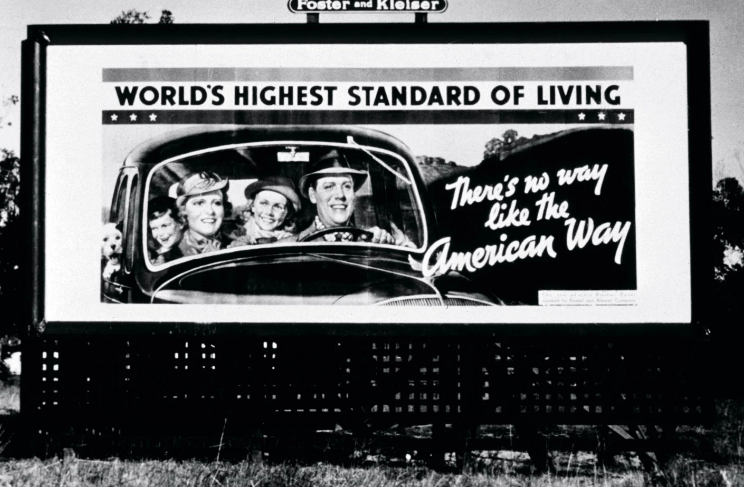The vast majority of Americans consider themselves "middle class." No one can quite agree, though, on what that means.
絕大多數(shù)美國人認為自己是“中產(chǎn)階級”。但對于中產(chǎn)階級的定義,沒人能夠達成一致意見。
Richard Reeves, along with colleagues at the Brookings Institution,
Richard Reeves和布魯金斯學會的同事
has cataloged no fewer than a dozen economic formulas that seek to define this elastic cohort largely by what people earn each year:
共同編制了不少于12種經(jīng)濟公式,試圖主要根據(jù)人們的年收入來定義這一彈性群體:
household income between X and Y; personal income that's within some percentage of the national median; distance from the poverty line; and so on.
家庭收入在X和Y之間;個人收入在全國中位數(shù)的某個百分比內(nèi);遠離貧困線等等。
Combine the lot, and the range of who might be considered middle class is extraordinarily expansive—
將這些因素結(jié)合起來,可被認為是中產(chǎn)階級的人的范圍就非常大了——
including anyone from a single, part-time bartender scratching by on $13,000 a year
比如靠著1.3萬美元年薪勉強糊口的單身兼職酒保
to a suburban power couple pulling in $230,000, or 90% of American households in all.
以及住在郊區(qū),年收入23萬美元的模范夫婦,或者是90%的美國家庭。
Other economists and social scientists stretch the boundaries of membership in different dimensions,
其他經(jīng)濟學家和社會科學家們從不同的維度拓展了中產(chǎn)階級成員資格的界限,
based on degrees of wealth or spending power, professional status or education level, what neighborhood you live in,
以財富和消費能力、專業(yè)地位或教育水平、居住社區(qū)為依據(jù),

or even on that very American of conceits, self-determination—which is to say, if you think you're middle class, you are.
甚至是以美國人的自負和自我決定為依據(jù)——也就是說,如果你認為自己是中產(chǎn)階級,那么你就是。
"I sometimes think there are as many definitions of the middle class as there are Americans claiming to be middle class," says Reeves,
“有時我認為,對中產(chǎn)階級有多少種定義就有多少美國人宣稱自己是中產(chǎn)階級,”Reeves說到,
a senior fellow at Brookings and director of its Future of the Middle Class Initiative,
他是布魯金斯學會的高級研究員,也是中產(chǎn)階級未來倡議的負責人,
who quickly throws in one of his favorite noneconomic definitions: "You're middle class if you have two refrigerators.
他很快給出了一個他最喜歡的非經(jīng)濟定義:“如果你有兩臺冰箱,那么你就是中產(chǎn)階級。
You have a new one in your kitchen, and you have your old one in the garage or basement, where you keep your beer."
你的廚房里有一臺新的,你的舊冰箱在車庫或你存放啤酒的地下室里。”
The U.S. is a middle-class nation—it was founded on middle-class ideals, he continues.
美國是一個中產(chǎn)階級國家——它是建立在中產(chǎn)階級理想之上的,他繼續(xù)說到。
And so defining one's self as middle class is, perhaps counterintuitively, aspirational in some ways.
所以將自己定義為中產(chǎn)階級可能在某種程度上是有反常識的,也是充滿抱負的。
"Americans don't like the idea of seeing themselves as upper crust, snobs, snooty, aristocrats, upper class, et cetera," says Reeves,
“美國人不喜歡把自己看成是上流社會、勢利的人、傲慢的人、貴族、上層階級等等,”Reeves說到,
an economist and self-described "recovered Brit" who has written a new book, Dream Hoarders, precisely on that rarefied American upper crust.
他是一名自詡“病愈的英國人”的經(jīng)濟學家,他寫的新書《Dream Hoarders》正是針對這一高高在上的美國上流社會。
"People also don't like to think of themselves as poor, or even as working class.
“人們不喜歡把自己看成是窮人,或工人階級。
To the extent that the U.S. has a class consciousness, it tends to be around the middle class."
就美國的階級意識而言,它往往是圍繞著中產(chǎn)階級。”
譯文由可可原創(chuàng),僅供學習交流使用,未經(jīng)許可請勿轉(zhuǎn)載。












